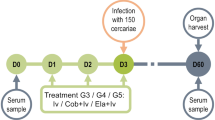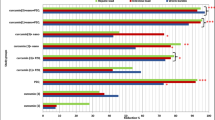Abstract
IN May 1963, Gordon, St. John and Olsen1 reported the prolongation of life in Swiss mice experimentally infected with a Puerto Rican strain of Schistosoma mansoni, when treated for 5 days with ‘Fungizone’ (amphotericin B made soluble with deoxycholate ; E. R. Squibb). In the foregoing experiment, treatment began at a level of 0.5 mg of ‘Fungizone’/kg body-weight of mouse a day. The dosage was increased in two daily increments of 0.5 mg/kg to a final level of 1.5 mg/kg a day, which was maintained for three days. Treatment began twelve weeks after infection (approximately 6 weeks after the parasite had begun producing ova). By one week subsequent to the termination of treatment, 80 per cent of the untreated but only 27 per cent of the treated animals had died. A χ2 test showed that the experimental results fit to a confidence limit of 98 per cent the hypothesis that treatment influenced survival.
This is a preview of subscription content, access via your institution
Access options
Subscribe to this journal
Receive 51 print issues and online access
$199.00 per year
only $3.90 per issue
Buy this article
- Purchase on Springer Link
- Instant access to full article PDF
Prices may be subject to local taxes which are calculated during checkout
Similar content being viewed by others
References
Gordon, B. L., St. John, P. A., and Olsen, G., Bact. Proc., 95 (1963).
Author information
Authors and Affiliations
Rights and permissions
About this article
Cite this article
GORDON, B., JOHN, P. Amphotericin B in the Chemotherapy of Experimental Schistosomiasis mansoni in Swiss Mice. Nature 200, 790–791 (1963). https://doi.org/10.1038/200790b0
Issue Date:
DOI: https://doi.org/10.1038/200790b0
Comments
By submitting a comment you agree to abide by our Terms and Community Guidelines. If you find something abusive or that does not comply with our terms or guidelines please flag it as inappropriate.



